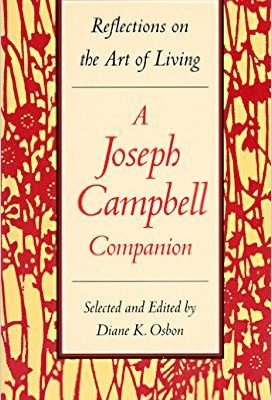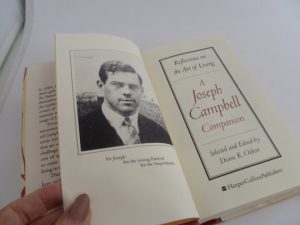 Excerpted from Reflections on the Art of Living, A Joseph Campbell Companion. Selected and Edited by Diane K. Osbon. P. 268 – 271 – Following are the words of Joseph Campbell, taking apart the mystery of Writer’s Block:
Excerpted from Reflections on the Art of Living, A Joseph Campbell Companion. Selected and Edited by Diane K. Osbon. P. 268 – 271 – Following are the words of Joseph Campbell, taking apart the mystery of Writer’s Block:
The creative adventure is always reckless. That goes even for the simple thing I do in writing a book. Fredric Schiller, a German poet in Goethe’s time, wrote an interesting letter to a young writer who had writer’s block—that’s refusal of the call in a writer. Schiller said in the letter, “Your problem is that you bring in the critical factor before the lyric factor has had a chance to express itself.” In poetry, for example, we spend our youth studying Shakespeare and Milton, and then we start to write our own pitiful little poem, we think, “Oh my god.”
When writing,
Don’t criticize the words coming out.
Just let them come.
Let go of the critical factor:
Will I make money? Am I wasting time?
My writing is of a very different kind from anything I have heard about. All this mythological material is out there, a big gathering of stuff, and I have been reading it for some forty- or fifty- odd years. There are various ways of handling that. The most common is to put the material together and publish a scholarly book about it. But when I’m writing, I try to get a sense of an experiential relationship to the material. In fact, I can’t write unless that happens. It is like putting it into some kind of meat grinder that grinds it into a new thing and yet does not do violence to the material. It’s very exciting when it comes together that way.
I don’t write unless the stuff is really working on me, and my selection of material depends on what works. Usually, with mythology, you are almost cheating, because it is all in shape anyhow. All the elementary ideas are there. You only have to recognize them, and the work cooks. It’s the damnedest thing: you are going along, and suddenly you find you have said things you did not know you were saying, because it is all right there.
When I’m writing, I think of the whole academic world: I know how they think about this material, and it is not the same way that I think about it. I just have to say, “Let the guillotine come down. You are still going to have this message.” I always feel as if I am going through the Clashing Rocks, and they are just about to close, but I manage to get through before I let that thought overcome me. It’s a very strange process: actually holding that door open and getting the sentences out. Do not think about the negative side. There will be negatives that are going to come down, but you have to hold the door open if you are going to do anything that has not been done before. You have to suspend all criticism to do your work. In writing, you have to do this all the time in order to get the sentence out. Suspending criticism is killing the dragon Thou Shalt. Kill him.
Get the writing out first.
Forget the critic and just write.
Afterward, you can bring in
the critical factor and prune.
If you have trouble because you are thinking, “Who is ever going to see this?” –then think of someone you know who would resonate to your statement and write for that person. It is a great facilitator to have a specific person in mind, until you no longer need an audience. Think of little children, for example, with their tiny eyes looking up at you. Talk to them. Write to them. In a book, you will often see a sincere dedication to the person for whom the book was written. Alice’s Adventures in Wonderland, for instance, was written for one specific little girl. When I started writing, I thought of my students at Sarah Lawrence, the actual people with whom I was dealing. I knew their thinking and the kinds of words that spoke to them.
The two things, then, that I’d say are necessary for breaking through what’s called writer’s block are, first, to have a person to whom you are addressing yourself and, second, to set aside a couple of hours a day when, as it were, you’re writing letters of love to that person.
Writer’s block results from
Too much head. Cut of your head.
Pegasus poetry, was born of Medusa
When her head was cut off.
You have to be reckless when writing.
Be as crazy as your conscience allows.
When you begin to get a sense of the material dictating form, you will be writing. It may happen fast, or it may take you a little while to find the flow. When I started writing The Masks of God, I dashed off the first book, Primitive Mythology. I was in a great hurry to get finished, because I had been given some money to go to Japan for a big session of the international Congress for the History of Religions, so I just churned it out. And then the reaction to it was so impressive to me—it was a much better book than I thought I had written—that when I started to write Volume II, I was blocked for a while, until I said, “Hey, listen, come off it. Stick your neck out and just write the book.” I thank God that I had read that letter of Schiller’s to the young poet.
may take you a little while to find the flow. When I started writing The Masks of God, I dashed off the first book, Primitive Mythology. I was in a great hurry to get finished, because I had been given some money to go to Japan for a big session of the international Congress for the History of Religions, so I just churned it out. And then the reaction to it was so impressive to me—it was a much better book than I thought I had written—that when I started to write Volume II, I was blocked for a while, until I said, “Hey, listen, come off it. Stick your neck out and just write the book.” I thank God that I had read that letter of Schiller’s to the young poet.
In religion, one speaks of the fear of God and the love of God. Fear of God will block you. Love of God will carry you on. If you can do something that you love to do without fear of criticism, you will move. You will find joy in it. You do not have to move more than an inch to feel the joy. Remember, the Buddha’s third temptation was dharma, duty, doing what people expect you to do. That’s the censorship fear.
After you have written something, when you see it in typescript, you will want to fool around with it, because it will be different from the way it was in script. Then, when you are satisfied with the typescript, you send it to the publisher. He accepts it, and when he sends you the galleys, you will want to fool with it again. Every time it appears in a form that is not the one directly out of your hand, you get an objective attitude toward it. In a way, you become the reader instead of the writer, and you see it in a new light. This crafting is part of the process of turning something into a work of art. I think that many people today do not realize what it means to be an artist, instead of simply a person who is writing. I mean there is a craft and an attitude and a willingness to recognize that, unless it is in form, it is not art.
Let your darlings out,
But murder them,
Or two years later,
You’ll wish you had.






